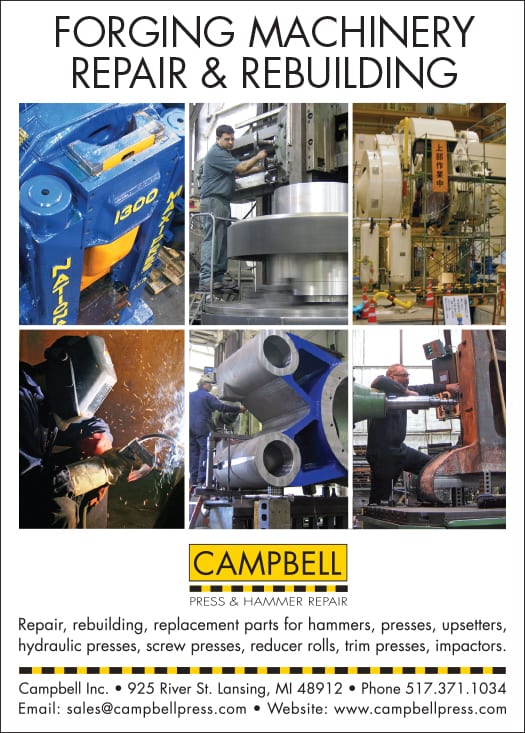NEWS
BUSINESS
U.K. Forger Announces EBW Breakthrough
Sheffield Forgemasters announced a breakthrough in the industrialization of electron-beam welding (EBW) for thick-section materials. Using EBW, the company weld-joined two 200-mm-thick (8-inch-thick), 3-meter-diameter (9-foot-diameter) forged vessel sections of nuclear-grade steel. The weld, equivalent to approximately 10 meters (32 feet) in length, was completed in a single pass and in a dramatically short timeframe. The weld was completed in 140 minutes with no reportable defects shown in preliminary nondestructive testing (NDT). A weld of this kind would typically take months and include numerous stages of NDT and heat treatment, according to U.K.-based Sheffield Forgemasters.
Sheffield Forgemasters aims to incorporate advanced fabrication techniques, which will provide significant savings on both processing time and cost through the potential of EBW over the more traditional method of tungsten inert gas welding for thick-section pressure vessels. The EBW process uses local vacuum and a high-power electron gun, which penetrates the vessel material with an electron beam, to melt and fuse the two components together in one pass rather than building up multiple layers of weld filler wire.
“We are due to start building an X-ray enclosure to house the EBW equipment, and it will be ready during the second quarter of 2022,” said senior development engineer and project lead Dr. Michael Blackmore. “We are also planning to fully demonstrate the welding capabilities by fabricating a full-scale nuclear pressure vessel that will consist of five main components – four shells and a nuclear head – to ensure a reliable and repetitive process.”
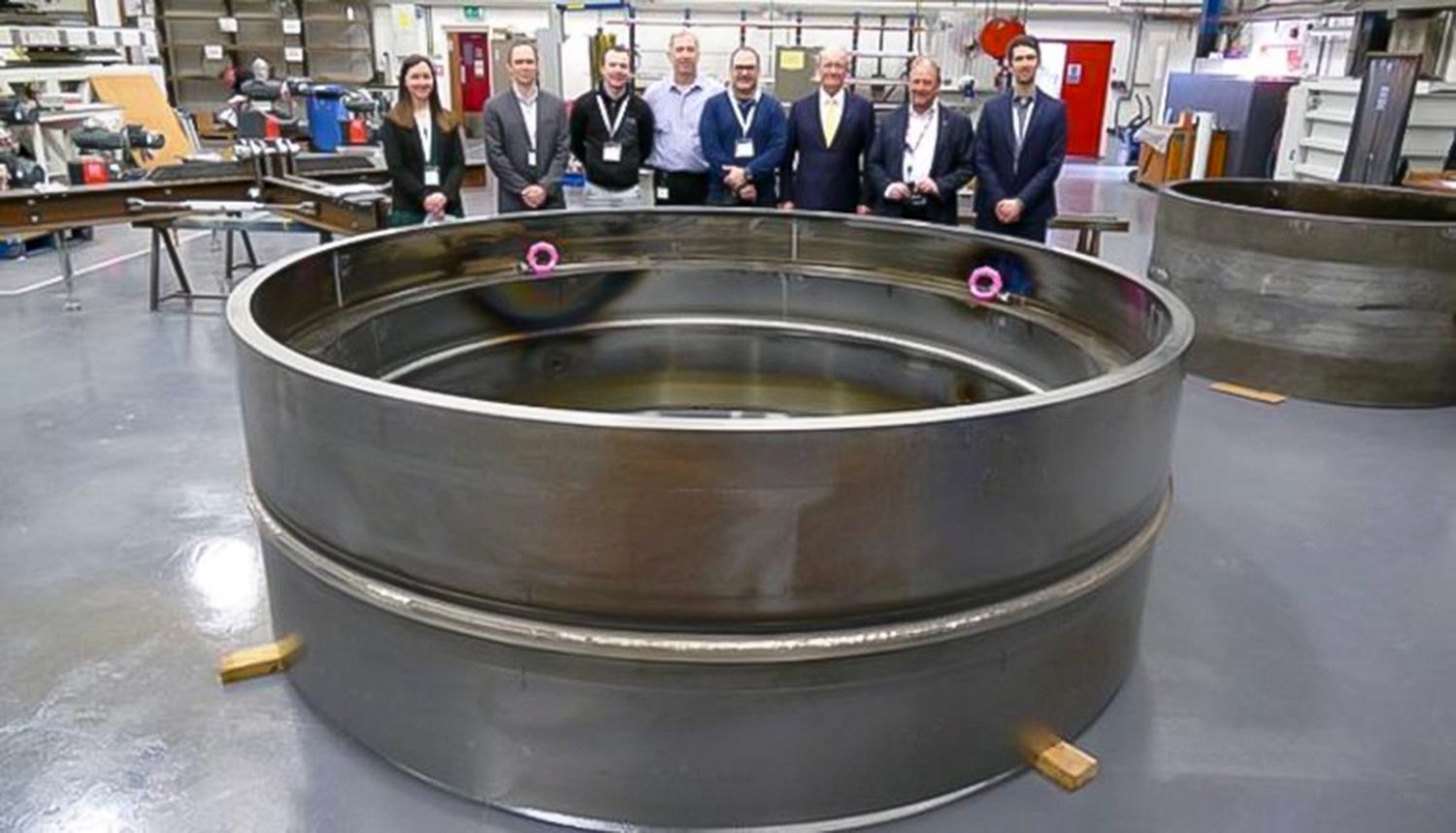
Image courtesy of Sheffield Forgemasters
Novelis Breaks Ground on Recycling Center in Kentucky
Novelis Inc. broke ground on a $365 million highly advanced recycling center in Guthrie, Ky. With an annual casting capacity of 240 kt of sheet ingot, the facility is expected to reduce the company’s carbon emissions by more than 1 million tons per year. It will add approximately 140 new jobs and will be built adjacent to Novelis’ existing automotive finishing plant in Guthrie. The new recycling center will be equipped with industry-leading processes and capabilities, including advanced shredding and sorting technology, as well as energy-efficient innovations to support the company’s sustainability goal to reduce energy intensity by 10% by 2026 and be net carbon neutral by 2050 or sooner.
The recycling center is expected to be operational in 2024. The Guthrie automotive finishing facility currently employs 150 people and expects to grow to 190 employees over the next two years. Novelis also operates an aluminum beverage-can recycling plant in Berea, Ky., and the Logan Aluminum joint venture in Russellville, Ky.
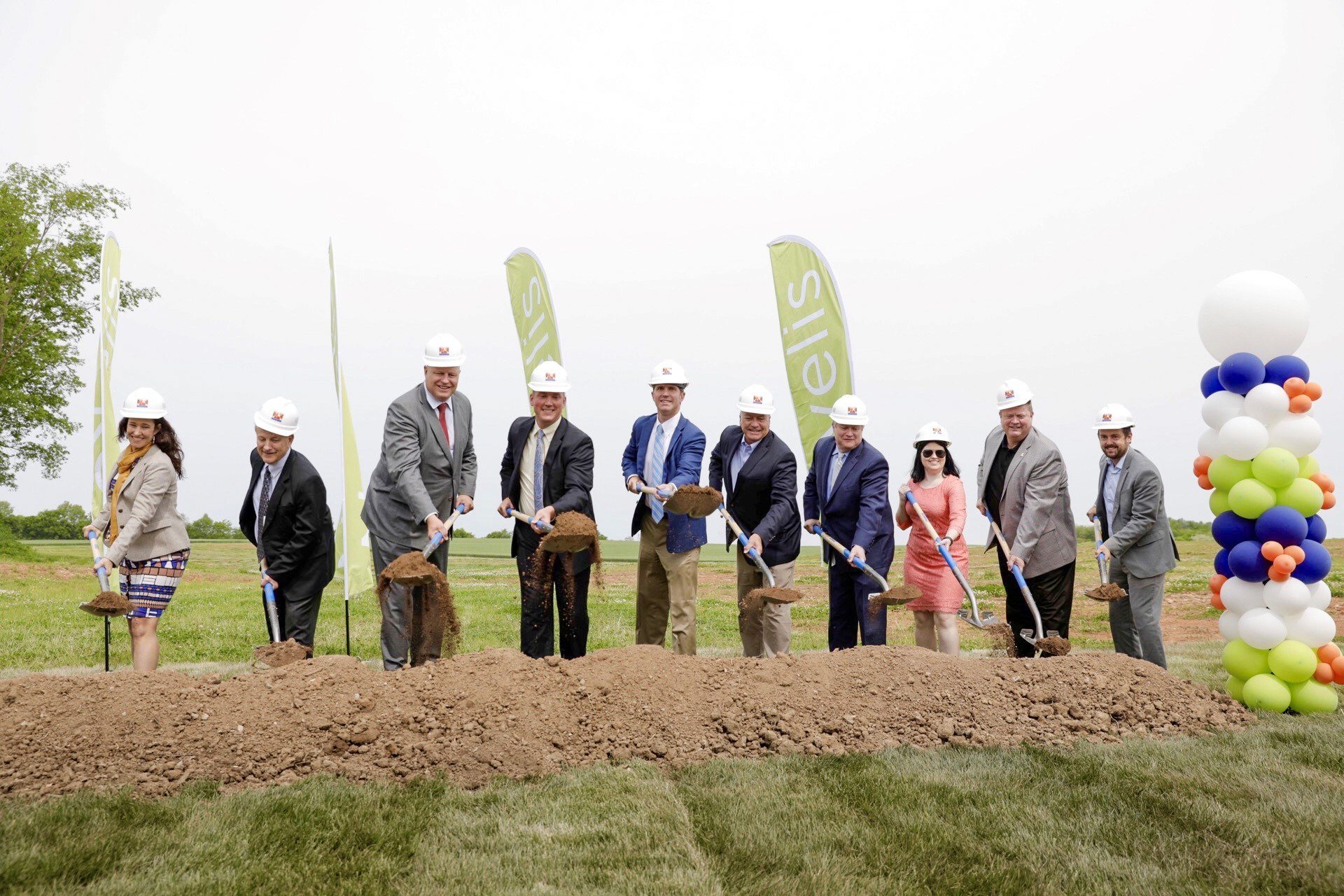
Image courtesy of Novelis
ADVERTISEMENT
Atlas Tube Opens ERW Mill in Arkansas
Atlas Tube, a division of Zekelman Industries, opened its newest steel mill in Blytheville, Ark. The company’s second in Blytheville, it will be dedicated to producing jumbo hollow structural sections (HSS) as large as 28 inches OD with walls up to 1 inch thick. According to Atlas Tube, the $150 million project is the largest private investment in the U.S. steel industry in the last decade. It is expected to create over 75 new jobs. The company says the 515,000-square-foot facility will be the largest continuous electric resistance welding (ERW) mill in the world, rolling HSS from 8 to 22 inches square.
The facility will include new welding technology designed to handle the 1-inch-thick sections. Zekelman Industries says quick-change technology will give the mill the shortest cycle times in the industry, and the line will feed into a fully automated warehouse to reduce delivery times and increase efficiency.
Construction Begins on Rare-Earth Manufacturing Facility in Texas
MP Materials Corp. began construction of its first rare-earth metal, alloy and magnet manufacturing facility in Fort Worth, Texas. The factory is a substantial component of a $700 million investment the company will make over the next two years to restore the U.S. rare-earth magnetics supply chain. The project will create around 150 high-skill jobs and 1,300 indirect jobs. MP Materials’ Fort Worth facility will have the capacity to produce approximately 1,000 metric tons of neodymium-iron-boron (NdFeB) magnets per year, supporting the production of approximately 500,000 EV traction motors. In addition to EVs, NdFeB magnets are critical inputs to robots, wind turbines, drones, defense systems and many other high-growth technologies.
In parallel, MP Materials and General Motors are co-announcing a definitive supply agreement to produce alloy and magnets for GM’s EV programs. Under the long-term agreement, MP Materials will supply U.S.-sourced and manufactured rare-earth materials, alloy and finished magnets for the electric motors in more than a dozen models using GM’s Ultium Platform.
In February, the Department of Defense awarded MP Materials $35 million to refine and separate heavy rare-earth elements at the company’s rare-earth materials production facility in Mountain Pass, Calif. MP’s Texas magnetics factory will source refined feedstock from Mountain Pass and transform it into finished products.
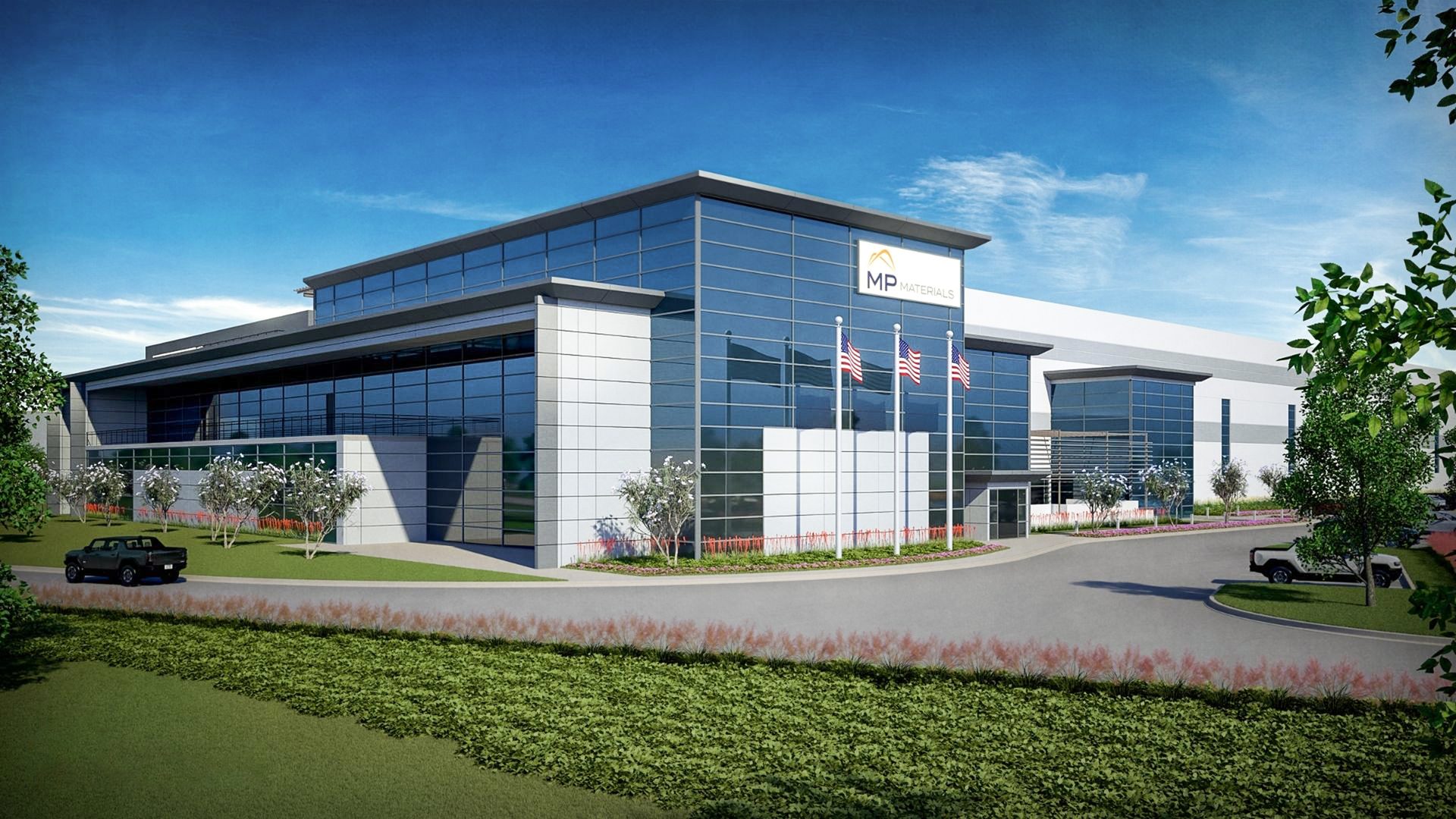
Image courtesy of MP Materials Corp.
Nucor, University Receive Federal Grant for Carbon Capture
Nucor Corp. is partnering with the University of Kentucky (UK) Research Foundation to test a carbon dioxide (CO2) capture system at Nucor Steel Gallatin. This is one of 12 research projects being funded by a Department of Energy grant to advance point-source carbon-capture and storage technologies that can capture CO2 emissions generated from natural gas power plants and industrial facilities that produce commodities like steel. More than 50 industry and university experts are working together to tackle the difficult challenge of applying carbon-capture and sequestration techniques to an electric-arc furnace (EAF) steelmaking process. Once this pilot is complete, Nucor and UK will have a better understanding of the costs and effectiveness of carbon-capture technology for flue gas with low CO2 content and the feasibility of replication of this technology at other EAF steel mills.
“The successful construction and testing of this heat-integrated carbon-capture process at Nucor Steel Gallatin shows great potential in lowering energy consumption at industrial sectors in Kentucky and across the nation,” said Kunlei Liu, principal investigator of the project and UK College of Engineering faculty member.
Aluminum Recycling Plant Opening in Michigan
Global aluminum company Hydro broke ground on its aluminum recycling plant in Cassopolis, Mich. Hydro will invest approximately $150 million in the facility, which will produce 265 million pounds of aluminum extrusion ingot per year and create approximately 70 new jobs. When completed, the plant will help Hydro reach its goal of doubling recycling of post-consumer aluminum by 2025. Applications for the aluminum produced in Cassopolis will be used for critical automotive applications and building system applications.
Norway-based Hydro is positioning itself to become the leading producer of low-carbon, recycled aluminum in North America. Recycling scrap aluminum requires only 5% of the energy used to produce primary aluminum, saving energy and reducing greenhouse gas emissions. Following completion of the Cassopolis plant, Hydro will have the ability to produce over 1 million metric tons of recycling-based aluminum billet each year in the United States.
The Cassopolis plant will be the first large-scale producer of Hydro CIRCAL in North America. Hydro CIRCAL aluminum extrusion ingot contains at least 75% post-consumer scrap, according to Hydro.
Image courtesy of Hydro
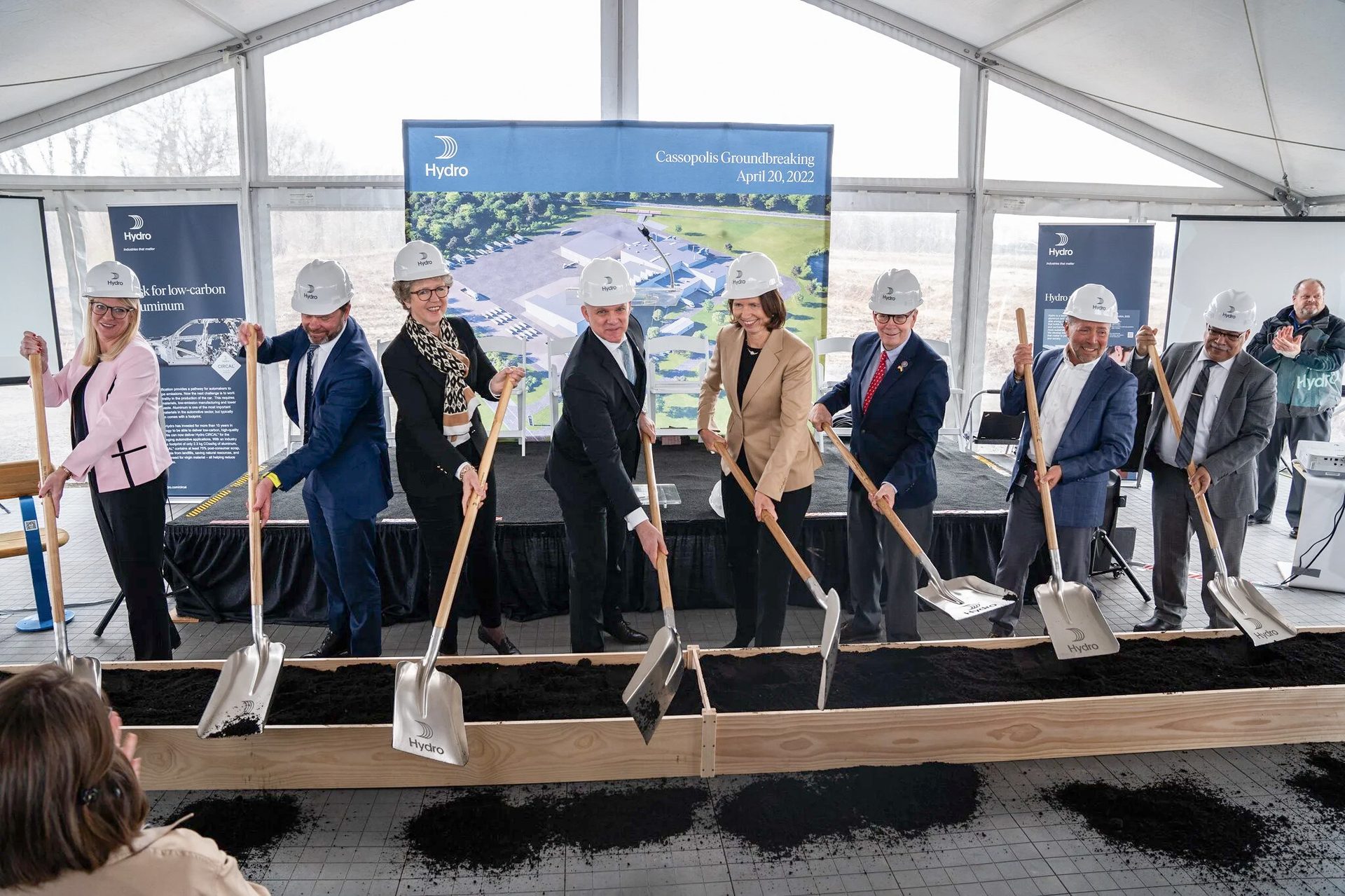
Image courtesy of Hydro
Austal USA Opens Shipbuilding Facility in Alabama
Austal USA opened its $100 million steel shipbuilding facility in Mobile, Ala. The addition of steel shipbuilding capability complements the company’s well-established aluminum shipbuilding expertise. The 117,000-square-foot manufacturing plant will house the latest computerized and robotic steel-processing equipment to handle all of the current and future demands of the U.S. Navy and the U.S. Coast Guard. A 60,000-square-foot stockyard will be utilized for handling the raw steel, and a 19,500-square-foot paint facility will provide the ability to paint and blast simultaneously in two separate cells.
Austal has delivered 15 Littoral Combat Ships (LCS) and 12 Expeditionary Fast Transports (EPF) to the Navy, while another seven total aluminum Navy ships are under construction. The company is also under contract to build two Navajo-class Towing, Salvage, and Rescue Ships (T-ATS). These will be the first steel ships constructed in the new facility.
INDUSTRIALHEATING.COM | BACK TO CONTENTS | JUNE 2022

